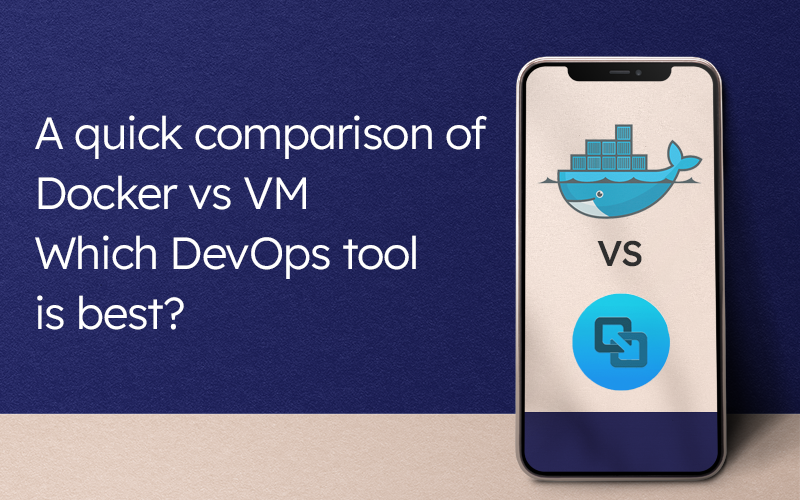A Quick Comparison of Docker vs. VM: Which DevOps Tool is Best?
Every application has its own set of dependencies, which comprise both software and hardware. A virtual machine (VM) is a software or computing environment that allows developers to access an OS through a physical machine.
When compared to conventional technologies, Docker containers introduce a slew of new tags to the chart. In terms of technology, it’s particularly intriguing in circumstances where it aids cloud portability by allowing users to execute the same programs across many virtual environments.
Docker is the most widely used container technology, according to Statista research. Docker is an open platform for developers, and it’s a tool for isolating application dependencies by putting them into containers. Containers are more scalable and easier to utilize and deploy than earlier methods.
For many of the benefits of cloud architecture, the VM has been the go-to standard. But what if there was a lighter, more cost-effective, more scalable equivalent to a virtual machine? Docker is a container-based platform mainly used for developing distributed applications.
Key Difference between Virtual machines Vs. Docker containers
- The OS support, portability, security, and performance are notable contrasts. Virtual machines and Docker containers have extremely diverse operating system support. When there are ‘n’ virtual machines, each virtual machine has its guest operating system that runs on top of the host operating system, making virtual machines quite hefty. Docker containers, on the other hand, share the OS, which is why they are lightweight.
- The containers share the host operating system, making them relatively light and allowing them to boot up in a matter of seconds. As a result, when compared to virtual machines, the overhead of managing the container system is quite minimal. Docker containers are best used when you need to execute numerous programs on a single os kernel. On the other hand, virtual machines are essential if servers or applications run on several operating system flavors.
- A Reliable docker deployment consultation helps you find the most significant distinction between a virtual machine and a Docker container. A virtual machine is a computer that is emulated by software, and a single specific computer can run several virtual machines, each with its operating system. On the other hand, Docker is a virtual machine-based container platform, and a container has no existence outside of the host’s operating system.
Virtual Machines and Docker Containers – Compliments each other
Docker Containers are reshaping the DevOps (developer operations) environment as a critical element in the DevOps toolbox. Docker Containers have a wide range of applications in the DevOps world. Using Docker Containers to run programs and then deploying them wherever (Cloud, on-premise, or any Linux flavor) is now a reality.
Virtual Machines enable considerable flexibility in heterogeneous environments, whereas Docker containers are focused on programs and their dependencies.
The only point of view that suggests which of the two should be picked is application design. Containers are ideal for applications requiring scalability and high availability; otherwise, virtual machines can be used.
However, Docker containers have certainly challenged the virtualization business. Containers in VM are easily said to be twice as resilient as one without the other. A hybrid strategy that uses both Docker and VM can be used on occasion.
Here are a few of them, along with explanations on how they work together as a Hybrid:
- Virtual Machines and Docker Containers are insufficient to run an application in production on their own. As a result, one should think about how Docker Containers would run in an enterprise data center.
- Containers provide application probability and enable consistent provisioning of the application across the infrastructure. Other operational requirements, such as performance, security, capacity management, and management tool integrations, remain difficult for Docker Containers, leaving everyone perplexed.
- Both Virtual Machines and Docker Containers are capable of providing security isolation.
- Docker Containers, despite being two independent technologies, may run inside Virtual Machines and give benefits such as proven isolation, mobility, security properties, software-defined storage, dynamic virtual networking, and a large ecosystem.Docker deployment consultation service providers can provide statistical insights on its benefits and deployment.
On a physical host with a specific configuration and virtual machines with the same configuration, running the same amount of Docker Containers with the similar performance on both.
Virtual Machines or Docker Containers – Which is the most effective?
The answer to this is not certain. However, experts suggest that containers are gaining ground on virtual machines based on their configurations and benefits. Gartner, a well-known global research firm, predicts that by 2023, more than 50%of all businesses will be using Docker containers.
However, revenue for a serverless container like Docker will increase from $465.8 million in 2020 to $944 million in 2024, from a low base of $465.8 million in 2020.
Recent Posts
Deep Learning Explained: Understanding the Brain Behind AI
The Intersection of AI and IoT: Creating Smarter, Connected Environments
The Evolution of AI: From Simple Algorithms to Neural Networks
The Role of AI in Sustainable Development
Scaling New Heights: Integrating Advanced Technologies in Startup Product Engineering
